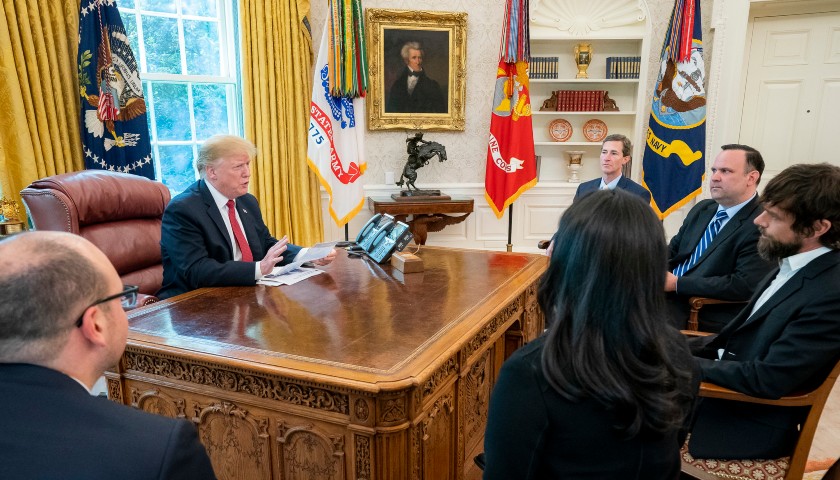by Rachel Bovard
After a series of mishaps involving muted senators, virtual cross-talk, and “connectivity issues” befuddling one of the world’s most tech-savvy men, the CEOs of Facebook, Twitter, and Google appeared before the Senate Commerce Committee on Wednesday for what has now become a performative ritual: senators of both parties yell about different aspects of social media, the tech giants respond with bland, vague, noncommittal statements. And nothing substantive happens.
This is exactly where the Senate Commerce Committee found itself on Wednesday, when Big Tech was confronted with a host of critics and without any defenders—but ultimately very little in the way of committed follow-up from legislators.
Perhaps the most notable item in the hearing was the performance of Twitter’s deeply weird CEO, Jack Dorsey, who rolled onto his screen in a Rasputin-length beard and an affectation suggesting he was coming down from a 36-hour bender. (Or, as they call it in Silicon Valley, a “vision quest.”)
Twitter was indisputably in the hot seat for Republicans over the company’s decision to block the distribution of the New York Post’s documented and well-sourced story regarding the business entanglements of both Joe Biden and his son, Hunter, with Communist China. (Facebook also limited the circulation of the story.)
At the time of the hearing, the New York Post story could only be shared by certain accounts, and the Post’s Twitter account remained locked.
When pressed on the impact of this by Senator Ted Cruz (R-Texas), Dorsey hilariously claimed that Twitter’s content moderation policies don’t impact electoral outcomes. Cruz, appearing caught off guard by the blatant absurdity of the statement, came back with an obvious rejoinder: if that’s true, then why does the platform moderate any content at all, particularly content claiming to be “misinformation” of a political nature?
But the real mind-bender was Dorsey’s answer to Cruz’s claim that the New York Post still couldn’t tweet, because their account was locked. Dorsey insisted that the New York Post could, in fact, both access its account and tweet the story, but only if it first accessed its account to delete the original tweet—the tweet that Twitter now concedes was proper.
Are you following that? The New York Post violated a Twitter rule that doesn’t exist anymore, but its account will not be unlocked until it follows the non-existent rule.
Because they must be taught a lesson. (Twitter folded on Friday and unlocked the Post’s account.)
Corporate Power vs. the Social Order
Congress may not feel compelled to take real action against the tech platforms, but it’s clear that the time has come to do so. Silicon Valley monopolies have evolved from mere way-points to share baby shower and birthday photos to massive, concentrated corporate power structures that define the terms of American discourse, independent thought and behavior, as well as market access.
As of late, the platforms are also redefining journalism. Consider that under the new standards of Twitter and Facebook, the revelations by Edward Snowden about the government’s domestic spy programs would be blocked for their reliance on material obtained in an unauthorized manner. So would every story about the Pentagon Papers. In an age dominated by digital media, whose consumption and business model depends on digital reach, these decisions have obvious and far-reaching consequences for a free society.
Social media companies are now a primary way in which Americans share, consume, and interpret information. They are not simply photo-sharing sites, or blogs about hamburgers, or networking platforms, or Dungeons and Dragons fan sites. They are very much integrated into the way we live now. We are reliant on unaccountable mega-corporate power as we have never been before.
Acknowledging this fact has implications for federal policy. No longer is this merely a question for the abstract and reductive ideology of “government should not interfere with private companies.” Rather, this becomes a question of governance—how does a democratic society choose to engage with corporations who are interfering with the social order? In other words, who shall rule? The people, or the corporations?
Our American system of self-government is designed to grapple with the difficult questions concerning how we organize ourselves through transparent, democratic, representative deliberation and debate. That principle—and the power struggle between the elements of our individual liberty and the corporate entities who would control them—are front and center in what is now an existential battle between truly free societies and mammoth corporate power.
Section 230, Big Tech’s Government Subsidy
In the Big Tech fight, this takes the shape of various policies designed to curtail, reframe, and restrain global tech power.
Wednesday’s hearing centered around the status of Section 230—the provision of federal law that immunizes the platforms from liability for third-party content posted on their sites, and also gives them wide discretion to remove content at their own discretion.
Section 230’s protections afforded a nascent internet key protections that allowed it to grow and flourish, rather than be hollowed out by lawsuit after lawsuit. Indeed, its protections are still worthwhile—for example, this online journal benefits from not being sued for content posted in its comments section.
But Section 230’s protections, particularly those most relied upon by the large platforms, have been judicially warped, twisted and bloated by courts away from the law’s original goal of providing reasonable protections for removal of lewd, obscene, and harassing content. Thanks to years of judicial interpretation, a once porous immunity has evolved into a bulletproof one, protecting everything from viral revenge pornography, harassment, and terrorist threats—and, until recently, knowingly facilitating the sex trafficking of minors.
Section 230 also provides wide latitude for tech companies to engage in viewpoint discrimination, a feature very much on display in the tech platforms’ treatment of the Trump White House, the Trump campaign, and now the New York Post’s attempts to report on Hunter Biden’s peddling of his dad’s political influence abroad.
A very dedicated group of D.C. think tanks will remind you that this is all First Amendment activity. Which is true, but this reminder conveniently sidesteps the fact that this content moderation occurs within the warm embrace of Section 230’s immunity.
In other words, the First Amendment activity of these platforms is privileged, over and above other media companies like newspapers, news outlets, or movie companies, all of which can be sued for libel and defamation. The protection is tantamount to “an implicit financial subsidy to the tech companies,” according to one pro-tech law professor.
Moreover, even if Section 230’s protections are repealed in their entirety (unlikely, given that most proposals support reform), the platforms don’t somehow lose their First Amendment right to speak. They just lose their privileged leg up on everybody else.
As Andrew McCarthy put it recently,
Section 230 immunity is a legal privilege to be earned by compliance with the attendant conditions. If an entity fails to comply, that just means it does not get the privilege; it does not mean the entity is being denied a right or being punished.
Republicans in Congress Must Swap Rhetoric for Substantive Action
Members of Congress have produced a bevy of bills to reform the law’s protections, but very few have even made it to a committee markup, let alone the House or Senate floor. For Republicans, rhetoric continues to trump sustained legislative effort—particularly in the Senate, where Republicans have a majority at least through December, and where individual Members have the power to make the Senate vote on initiating consideration of a Section 230 bill.
The Right retains a healthy skepticism of government policy interfering with business, believing that the most functional economies are those largely left alone. With that, I would generally agree—though with the caveat that our free market is one with plenty of government interference that the Right supports.
This is true of the tech companies as well. They are benefiting from a legal privilege passed by Congress 24 years ago. As such, it is entirely appropriate for Congress to be reviewing the ongoing applications of statutes for their relevance and appropriateness in the modern era. Oversight of its own policies is, in fact, a key role that Congress should play.
Conservatism, fully and properly understood, has always been wary of undue concentrations of power, wherever they reside. Russell Kirk, Barry Goldwater, William F. Buckley, and even the great libertarian Friedrich Hayek all recognized the threat concentrated corporate power posed to free societies, and the legitimacy of government, in the interest of protecting self-government, to act against it.
Reforming Section 230 is hardly the only remedy Congress could use to address the tremendous power these companies have amassed. But what is clear is that these redundant hearings are now of little use. Corporate power of a new and evolving kind has manifested itself as a threat to our current social order, and this warrants a policy response.
In America, the people rule. And it is time for their voices to compel action in what is supposed to be our self-governing republic. No longer should we tolerate what has become just performative rhetoric posing as substantive debate, but resulting in nothing.
– – –
Rachel Bovard is senior director of policy at the Conservative Partnership Institute and Senior Advisor to the Internet Accountability Project. Beginning in 2006, she served in both the House and Senate in various roles including as legislative director for Senator Rand Paul (R-Ky.) and policy director for the Senate Steering Committee under the successive chairmanships of Senator Pat Toomey (R-Penn.) and Senator Mike Lee (R-Utah), where she advised Committee members on strategy related to floor procedure and policy matters.
Photo “Trump Dorsey” by The White House.





